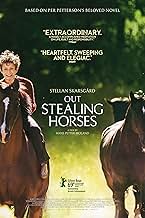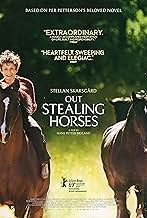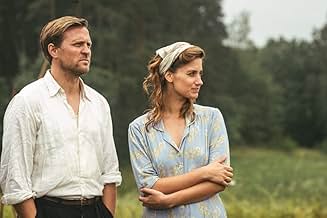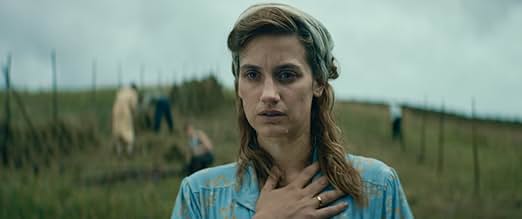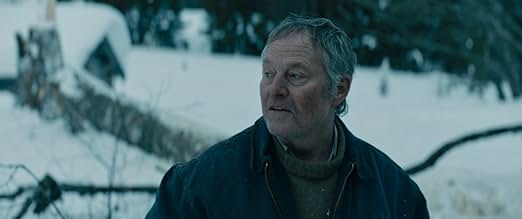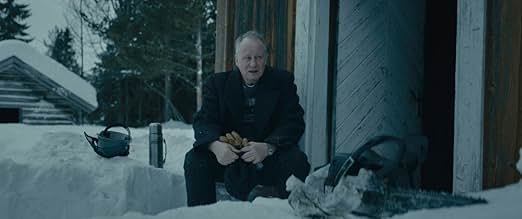VALUTAZIONE IMDb
6,5/10
3493
LA TUA VALUTAZIONE
Aggiungi una trama nella tua linguaA grieving widower moves to the country where a chance encounter rekindles memories from his past.A grieving widower moves to the country where a chance encounter rekindles memories from his past.A grieving widower moves to the country where a chance encounter rekindles memories from his past.
- Regia
- Sceneggiatura
- Star
- Premi
- 7 vittorie e 11 candidature totali
Tone Beate Mostraum
- Tronds mor
- (as Beate Mostraum)
Anders Baasmo
- Olav
- (as Anders Baasmo Christiansen)
Recensioni in evidenza
Saw this at the Berlinale 2019, where it was part of the official Competition for the golden bear. While not winning the 1st Prize, the jury awarded a Silver Bear for Outstanding Artistic Contribution, for Rasmus Videbæk who was responsible for the cinematography. Be that as it may, however, the movie failed to interest me in the protagonists and their behavior. Shots of landscapes, rivers, nature and (of course, given the title) the horses were more interesting than what the actors said and did. So, it could have been a nice watch but that is never my prime reason to see a movie.
In particular, the frequent switching between 1999 and 1948 annoyed me several times. It broke the logic flow in the story line. Luckily, it was clear with every flash back/forward in which time frame we were, due to other actors playing the younger variants. For me it remained unclear from start to finish what it was that the protagonists did tick, and why they did what they did. I cannot imagine that the fatal Cain/Abel scene, where a young boy inadvertently shot his brother, can have such a long term bearing on everyone actions, but what do I know??
Maybe the underlying book is better in explaining the psychology driving these people's actions, but I missed it dearly here. It is even very well possible that the Cain/Abel scene was not so important after all, but that it was the woman he had eyes on but who was in fact courted by his father. I wonder, due to suggestions in that direction in the announcement on the Berlinale website, but I can recall only a single scene from memory to more or less confirm this plot element.
All in all, despite the visual elements to make it a nice watch, I failed to get interested in the story or the psychology of the protagonists. I see hints in various reviews that there is more substance than I could derive from it. Such things can happen during a festival where one sees three of four movies per day.
In particular, the frequent switching between 1999 and 1948 annoyed me several times. It broke the logic flow in the story line. Luckily, it was clear with every flash back/forward in which time frame we were, due to other actors playing the younger variants. For me it remained unclear from start to finish what it was that the protagonists did tick, and why they did what they did. I cannot imagine that the fatal Cain/Abel scene, where a young boy inadvertently shot his brother, can have such a long term bearing on everyone actions, but what do I know??
Maybe the underlying book is better in explaining the psychology driving these people's actions, but I missed it dearly here. It is even very well possible that the Cain/Abel scene was not so important after all, but that it was the woman he had eyes on but who was in fact courted by his father. I wonder, due to suggestions in that direction in the announcement on the Berlinale website, but I can recall only a single scene from memory to more or less confirm this plot element.
All in all, despite the visual elements to make it a nice watch, I failed to get interested in the story or the psychology of the protagonists. I see hints in various reviews that there is more substance than I could derive from it. Such things can happen during a festival where one sees three of four movies per day.
There are no spoilers in this review.
This magnificent film is based on Per Petterson's novel 'Out Stealing Horses' (Ut Og Stjæle Hester). I discovered this film at the 2019 Scandinavian Film Festival in Australia. It is mesmerising, poetic, and the cinematography is truely breathtaking. The soundtrack is both haunting and unique. Each scene was an exercise in detail. Waterfalls, owls, rainstorms, wind, moss, rivers, trees, and horses in the Norwegian forest provided a rich tapestry of backdrops which were seamlessly integrated into the story.
The clever use of seasons made the story's timeline easy to follow. The major storyline took place in the summer of 1948, and the flashbacks (from the main character, Trond) were from the winter of 1999. There was also one short scene that took place during the German occupation of Norway, and another brief scene from around 1957.
This film is both visual and script driven. The acting from every character was flawless. It goes without saying that the performances from both Stellan Skarsgård (the 67 year old Trond) and Tobias Santelmann (Trond's father) were brilliant - as always from these two seasoned actors. The real stunner, however, was Jon Ranes playing the 15 year old Trond who did a lot of the heavy lifting for this film. He was amazing and really brought life to the character and the story. I think great things await Ranes as an actor going forward.
The movie is about a 67 year old Norwegian man (Trond) reflecting back on a summer he spent with his father when he was 15 years old. The movie navigates multiple issues. These include how traumatic events early in ones life can affect a person, coming of age, father/son relationships & rivalries, loss, overcoming life's obstacles, and abandonment were all explored. If you love beautiful and deeply meaningful movies - this one should not be missed. It is really something special.
This magnificent film is based on Per Petterson's novel 'Out Stealing Horses' (Ut Og Stjæle Hester). I discovered this film at the 2019 Scandinavian Film Festival in Australia. It is mesmerising, poetic, and the cinematography is truely breathtaking. The soundtrack is both haunting and unique. Each scene was an exercise in detail. Waterfalls, owls, rainstorms, wind, moss, rivers, trees, and horses in the Norwegian forest provided a rich tapestry of backdrops which were seamlessly integrated into the story.
The clever use of seasons made the story's timeline easy to follow. The major storyline took place in the summer of 1948, and the flashbacks (from the main character, Trond) were from the winter of 1999. There was also one short scene that took place during the German occupation of Norway, and another brief scene from around 1957.
This film is both visual and script driven. The acting from every character was flawless. It goes without saying that the performances from both Stellan Skarsgård (the 67 year old Trond) and Tobias Santelmann (Trond's father) were brilliant - as always from these two seasoned actors. The real stunner, however, was Jon Ranes playing the 15 year old Trond who did a lot of the heavy lifting for this film. He was amazing and really brought life to the character and the story. I think great things await Ranes as an actor going forward.
The movie is about a 67 year old Norwegian man (Trond) reflecting back on a summer he spent with his father when he was 15 years old. The movie navigates multiple issues. These include how traumatic events early in ones life can affect a person, coming of age, father/son relationships & rivalries, loss, overcoming life's obstacles, and abandonment were all explored. If you love beautiful and deeply meaningful movies - this one should not be missed. It is really something special.
Full of fascinating...ographies and curious adolescent...chologies but as bland as wallpaper paste mixed with plain flour, only curiosity is why they've stolen your sleep sheep and replaced them with this - same effect - lights out!
Greetings again from the darkness. Contrasts are plentiful in this film. The bleakness of winter versus the greenery of summer. The resignation of old age versus the naivety of youth. Pet Petterson's award-winning novel was released in Norway in 2003, and then in English version in 2005. Norwegian director Petter Moland tackles it with the best intentions, though the nuances prove too much for one movie. Mr. Moland is a fine director as evidenced by his excellent IN ORDER OF DISAPPEARANCE (2014) with Stellan Skarsgard and the English remake COLD PURSUIT (2019) with Liam Neeson.
Morland and Skarsgard reunite as the actor takes on the role of the elder Trond, who we first see as he has relocated to Norway from Sweden. Through his narration, we learn Trond has lived in Sweden for 42 years, and it's a chance meeting with his new neighbor Lars (Bjorn Floberg) that triggers memories of one summer when he was 15 years old. It's now 1999, and the impending new millennium has Trond self-isolating on top of the grief and loneliness he has carried since his wife was killed in a car crash. Skarsgard is an actor who can be either sympathetic or powerful, and he brings gravitas to a character who is mostly lost at this late stage in life.
Much of the film is spent in Trond's flashback to 1948, when he lived the summer with his father, a "practical" man, at his cabin in Norway. Young Trond is played very well by Jon Ranes in his first role. He clearly admires his father (Tobias Santelmann, KON-TIKI, 2012) and enjoys working beside him and taking rain showers alongside. Over the weeks, Trond and his father become entangled with a village family after a tragedy involving Lars (the future neighbor) when he was very young, and Lars' father and mother (Danica Curcic). What follows for Trond are the things in life that cause us to alter our view of people and the world. Lost innocence is rarely easy.
Cinematographer Rasmus Videbaek (A ROYAL AFFAIR, 2012) captures the beauty of nature during the 1948 summer, as well as the stark white stillness of 1999 winter. Some of the look and feel and symbolism reminds of the work of Terrence Malick. The stunning Norwegian landscapes play a role for us as viewers and for Trond. There are also some quiet moments that carry weight between the elder Lars and Trond, as the missing pieces of life slowly fall into place.
The elder Trond states his goal is "to sleep as heavily as possible without being dead", but we see part of him may have already died. Flashbacks to that summer, and even earlier during the war, combine with some awkward conversations with Lars to fill in gaps that had blurred over the years. Childhood memories from old age are often not to be trusted, but coming to grips with one's family and the past may bring peace - or it may not. Trond is an avid reader of Dickens' "David Copperfield" and there are many references throughout. He's even given life advice: "Don't be bitter", which is a worthy goal for all. It's an odd film with multiple timelines and damaged characters at different stages. It may not reach the level of Petterson's novel, but director Moland gives us plenty to mull.
Morland and Skarsgard reunite as the actor takes on the role of the elder Trond, who we first see as he has relocated to Norway from Sweden. Through his narration, we learn Trond has lived in Sweden for 42 years, and it's a chance meeting with his new neighbor Lars (Bjorn Floberg) that triggers memories of one summer when he was 15 years old. It's now 1999, and the impending new millennium has Trond self-isolating on top of the grief and loneliness he has carried since his wife was killed in a car crash. Skarsgard is an actor who can be either sympathetic or powerful, and he brings gravitas to a character who is mostly lost at this late stage in life.
Much of the film is spent in Trond's flashback to 1948, when he lived the summer with his father, a "practical" man, at his cabin in Norway. Young Trond is played very well by Jon Ranes in his first role. He clearly admires his father (Tobias Santelmann, KON-TIKI, 2012) and enjoys working beside him and taking rain showers alongside. Over the weeks, Trond and his father become entangled with a village family after a tragedy involving Lars (the future neighbor) when he was very young, and Lars' father and mother (Danica Curcic). What follows for Trond are the things in life that cause us to alter our view of people and the world. Lost innocence is rarely easy.
Cinematographer Rasmus Videbaek (A ROYAL AFFAIR, 2012) captures the beauty of nature during the 1948 summer, as well as the stark white stillness of 1999 winter. Some of the look and feel and symbolism reminds of the work of Terrence Malick. The stunning Norwegian landscapes play a role for us as viewers and for Trond. There are also some quiet moments that carry weight between the elder Lars and Trond, as the missing pieces of life slowly fall into place.
The elder Trond states his goal is "to sleep as heavily as possible without being dead", but we see part of him may have already died. Flashbacks to that summer, and even earlier during the war, combine with some awkward conversations with Lars to fill in gaps that had blurred over the years. Childhood memories from old age are often not to be trusted, but coming to grips with one's family and the past may bring peace - or it may not. Trond is an avid reader of Dickens' "David Copperfield" and there are many references throughout. He's even given life advice: "Don't be bitter", which is a worthy goal for all. It's an odd film with multiple timelines and damaged characters at different stages. It may not reach the level of Petterson's novel, but director Moland gives us plenty to mull.
I did not have expectations to the movie, as I started reading the book once, and put it down after reading not too long, finding it not to my taste. It seems I should have continued reading. The movie is in any case rare in story and filming. Soft, thrilling, surprising, intriguing worth watching. A beautiful movie to watch. Reminds me of movies like the cider house rules, the emigrants (innvandrarna/utvandrarna) and Pelle Erobreren.
Lo sapevi?
- QuizTobias Santelmann, Pål Sverre Hagen and Anders Baasmo previously worked together on Kon-Tiki (2012), as Knut Haugland, Thor Heyerdahl, and Herman Watzinger respectively.
- Colonne sonoreVindhester
Composed by Kåre Vestrheim
I più visti
Accedi per valutare e creare un elenco di titoli salvati per ottenere consigli personalizzati
- How long is Out Stealing Horses?Powered by Alexa
Dettagli
- Data di uscita
- Paesi di origine
- Sito ufficiale
- Lingue
- Celebre anche come
- Out Stealing Horses
- Luoghi delle riprese
- Aziende produttrici
- Vedi altri crediti dell’azienda su IMDbPro
Botteghino
- Budget
- 4.100.000 € (previsto)
- Lordo in tutto il mondo
- 1.480.790 USD
- Tempo di esecuzione
- 2h 3min(123 min)
- Colore
- Proporzioni
- 2.35 : 1
Contribuisci a questa pagina
Suggerisci una modifica o aggiungi i contenuti mancanti



